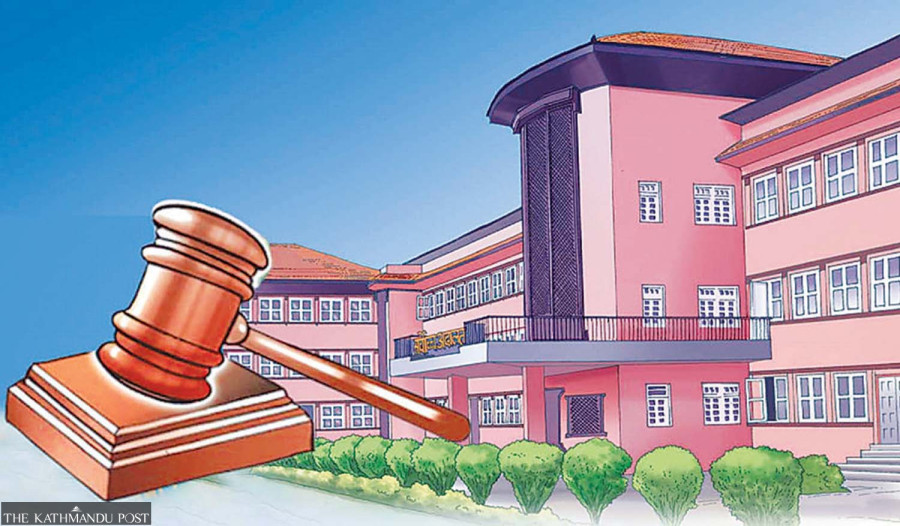National
Crucial disputes linger as Constitutional Bench fails to act
Chief justice-nominee Hari Krishna Karki is skipping the bench to avoid upsetting political parties ahead of his confirmation hearing in Parliament, experts allege.
Binod Ghimire
The Constitutional Bench of the Supreme Court on Wednesday was supposed to start the final hearing on the writ petitions challenging the appointments made in around a dozen constitutional commissions. These appointments were made by amending the Constitutional Council Act through an ordinance in 2020.
The weekly cause list (list of cases to be heard) of the top court had prioritised five different petitions relating to the appointments for hearing. However, when the daily cause list was published for Wednesday, there was no mention of the Constitutional Bench. The hearing of the crucial petitions was postponed yet again.
Last week, on May 31, the bench was supposed to hear the petitions against CPN (Maoist Centre) Vice-chair and former Speaker Agni Sapkota, who is accused of murder after the enforced disappearance of Arjun Lama from Sindhupalchowk district.
However, the apex court administration did not form the bench that day as well. Previously, there was a practice of constituting a Constitutional Bench twice a week—on Wednesdays and Fridays. Although the number of petitions in the bench have been increasing, the court administration started having the bench only on Wednesdays and that too has not been happening regularly.
Article 137 of constitution envisions a five-member Constitutional Bench led by Chief Justice to mainly settle disputes related to jurisdiction between the federation and provinces, between provinces, between a province and local units, and between local units. It is also entrusted with giving verdict in cases that call for interpretation of the constitution. The bench also decides most of the writ petitions which are complex in nature.
However, its sluggishness has left dozens of crucial petitions like the one challenging the 52 appointments including chairpersons and members of various constitutional commissions sub judice over the years. There are around 250 petitions in the bench’s docket.
Court officials cite the busy schedule of acting Chief Justice Hari Krishna Karki and other senior justices as the reason for not constituting the bench. “The Acting Chief Justice is currently monitoring lower courts in the Kathmandu Valley while some other justices are in different districts on similar monitoring missions,” Devendra Dhakal, information officer at the Supreme Court, told the Post.
The constitution envisions up to 21 justices including Chief Justice for the apex court. However, only 16 of them are available as five positions remain vacant. Among them, only nine justices have been regulars in the court for the past one week. Karki himself hasn’t taken part in any hearing since June 1.
The Constitutional Bench, which is led by Karki, usually has four other senior justices—Bishowambhar Prasad Shrestha, Ishwar Prasad Khatiwada, Ananda Mohan Bhattarai and Anil Kumar Sinha—as members. However, Karki and Shrestha have not been attending court proceedings for over a week now.
Legal experts say Karki is deliberately avoiding the Constitutional Bench, which is supposed to pass verdicts on crucial petitions, to avoid creating adversaries. “Karki is doing that as his parliamentary hearing is round the corner. He doesn’t want to antagonise the political parties,” Gopal Krishna Ghimire, president of Nepal Bar Association, told the Post. The Parliamentary Hearing Committee on May 30 solicited complaints from the public against Karki, who was nominated for chief justice on May 8.
He can become the chief of the judiciary only after he gets through the 15-member hearing committee which has lawmakers from both the Houses of federal parliament.
Om Prakash Aryal, constitutional and human rights lawyer, said the way the Supreme Court is functioning under Karki gives ample room to suspect its impartiality and competence. “Who is benefitting from the repeated deferral of crucial petitions like the one challenging appointments in constitutional commissions?” said Aryal, who is among the petitioners challenging the appointments. “We protested against Cholendra Shumsher Rana for his partiality and incompetence. But the new leadership seems no better. It must be answerable to the way the apex court is functioning these days.”
Not just under the present leadership, the performance of the Constitutional Bench has never been very effective.
For instance, the Madhesh government challenged the then KP Sharma Oli government's decision of June 2019 to bring the Sagarnath Forest Development Project under the Timber Corporation of Nepal. The government of the Madhesh Province, then called Province 2, challenged the decision arguing that the federal government had breached the jurisdiction of the province. It has filed five other petitions challenging the federal government. However, except for issuing an interim order, no verdict has been reached in any of the cases.
“The court’s performance is tiringly sluggish. This cannot continue,” said Aryal.




 18.12°C Kathmandu
18.12°C Kathmandu














